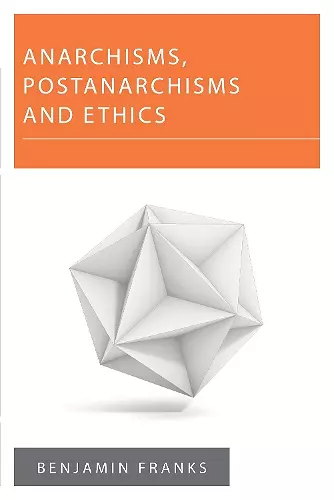Anarchisms, Postanarchisms and Ethics
Format:Paperback
Publisher:Bloomsbury Publishing PLC
Published:5th Nov '19
Currently unavailable, and unfortunately no date known when it will be back

What are the core features of an anarchist ethics? Why do some anarchisms identify themselves as anti-moral or amoral? And what are the practical outcomes of ethical analysis for anarchist and post-anarchist practice?
This book shows how we can identify and evaluate different forms of anarchism through their ethical principles, and we can identify these ethics in the evolving anarchist organizations, tactics and forms of critique.
The book outlines the various key anarchist positions, explaining how the identification of their ethical positions provides a substantive basis to classify rival traditions of thought. It describes the different ideological structures of anarchism in terms of their conceptual organization integrated into their main material practices, highlighting that there is no singular anarchism. It goes on to assess distinctive approaches for identifying and categorizing anarchism, and argues that it is best viewed not as a movement that prioritizes rights and liberal accounts of autonomy, or that prescribes specific revolutionary goals, but as a way to challenge hierarchies of power in the generation of social goods. Finally, the book uses case studies from contemporary issues in educational practice and pertinent political conflicts to demonstrate the practical applicability of a virtue approaches to anarchism.
Benjamin Franks has championed the study of virtue ethics to pinpoint and assess alternative morphologies of anarchism. Showcasing this approach, he mounts a robust defence of anarchist political theory while simultaneously recording the processes this endeavour involves; an intensely reflective, sometimes provocative and innovative book which invites critical theorists to recognise, question yet still persevere with the class roles they play. -- Ruth Kinna, Professor of Political Theory, Loughborough University
Anarchists have long recognised that resistance is fertile, that we change both ourselves and the world by our activity. So Franks’ Anarchisms, Postanarchisms and Ethics should be welcomed by academics and non-academics alike for it shows well how similar words hide real differences, differences which only become clear through practice – which he rightly suggests makes perfect, on many levels! -- Iain McKay, Editor of The Anarchist FAQ and Black Flag
Erudite, thoughtful and engaging, this book is on the cutting edge of anarchist theory today. It deserves close attention from anyone interested in the conceptual and ethical dimensions of revolutionary practice. For rigour and clarity, Franks remains unsurpassed. -- Uri Gordon, Teaching Fellow in Political Theory, Durham University, UK
Franks writes with incredible clarity, frankness and humour. His illustrative examples are funny enough to provoke genuine laughter. The ease with which his friendly authorial voice guides the reader through debates belies the complexity and precision of the ideas he conveys. I learnt an awful lot from reading this - it is a rare gem of a book. -- Rhiannon Firth, Senior Research Officer, Department of Sociology, University of Essex, UK
The role that values, norms, and other ethical concepts play in anarchist thought theory has long been, and continues to be, a matter of considerable dispute—albeit one that has received precious little in the way of sustained attention in existing scholarly literature. Anarchisms, Postanarchisms and Ethics boldly challenges this state of affairs by taking the dispute head-on with unprecedented rigor, precision, and cogency. In so doing, it promises to be one of the most significant contributions to contemporary anarchist thought in recent memory. -- Nathan Jun, Associate Professor of Philosophy, Midwestern State University, USA
Deepening our understanding of anarchism as an ideology, Franks demonstrates that an intersubjective and practice-based virtue ethics is compatible with classical and contemporary anarchist thought. Rooted in comprehensive scholarship across the domains of political theory, moral philosophy, and various anarchist traditions, this book is an essential starting point for any future explorations into anarchist ethics. -- Leonard A. Williams, Professor of Political Science, Manchester University, USA
ISBN: 9781783488308
Dimensions: 223mm x 153mm x 14mm
Weight: 331g
238 pages